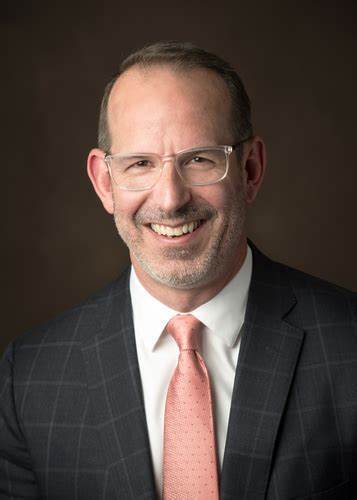David Wyatt: Thriving in today’s perioperative environment

The COVID-19 pandemic has brought to stark focus several ways the nation’s current healthcare system needs to change. But for those already in the profession, these systematic issues have always been present, and a select few have been tirelessly working towards change years before the pandemic. One such individual is David Wyatt, PhD, MPH, RN, CNOR, NEA-BC, chief nursing officer of the University Hospitals at the University of Texas Southwestern Medical Center in Dallas, where he is responsible for nursing leadership and care delivery.
Since the moment Wyatt started his 9-year tenure at Vanderbilt University Hospital in 2010, he has worked toward executing change in perioperative nursing. What drove his efforts? His desire to help nurses find their ground and solidify their place in leadership. At Vanderbilt, Wyatt helped implement a huddle for charge nurses to focus on operational efficiencies in the morning and staffing decisions in the afternoon, and he helped create an executive unit board for nurses to connect on issues and come to resolutions.
Wyatt is an experienced nurse leader in the perioperative, inpatient, and ambulatory settings, holding prior leadership positions at various community and academic medical centers. He was president of AORN from 2020 to 2021, and in 2015, he received AORN’s Excellence in Perioperative Nursing award, the highest individual honor in the specialty, for his contributions in research, education, and practice

David Wyatt, PhD, RN, NEA-BC, CNOR
David Wyatt, PhD, RN, NEA-BC, CNOR

I am a relationship-oriented leader. I resonate a lot with the servant-leader method of leadership. I strongly believe that leaders need to gear their styles to what their teams need. I have worked with leaders over the years who have said, “this is my style of leadership,” as if everyone has to accommodate to them. I think that is problematic. If you are a leader and you do not pay attention to what your team needs, and you require everybody to accommodate to you, you are not executing a very good leadership model.
The Magnet Model talks a lot about transformational leadership, and I think a lot of that is geared towards leaders who are paying attention to the needs of their teams.
Over the years, I have had veteran nurses and novice staff members. Working with both generations of professionals requires leaders to execute different styles of leadership, adapting their style as their teams change. A veteran, well-seasoned team, for instance, does not require as much direct involvement and direction. However, the novice team does require more of that. It can be very problematic when leaders refuse to adapt and modify their styles, and the challenges born out of that are solely on the shoulders of those leaders, not the staff.

I have had some very good mentors over the years. Nancy Feistritzer, bar none, was the strongest influence in my career. We had a lot of similar characteristics. She helped mentor me and taught me the importance of knowing I was valued, and I learned from that. You do not want someone you are hiring to question whether you value them. There are little things that you do that sends the message of whether you value them or not. She taught me to strengthen that aspect more. I also learned from her how to think more strategically across the organization. I came to Vanderbilt with a lot of very specific knowledge on how to run an operation, but I did not have as much experience with thinking at a broader scale. She helped me develop that strategic skill set.
As you grow as a leader, it becomes more important that you think more strategically and long-term, rather than whether you know the right answer to a specific situation. That has helped the most in my growth. It is important to be an expert when you are at a lower level of leadership. But as you grow in your leadership, it is less important to be an expert and more important to be a listener.
You need to listen to what the needs are and start to let go of the need to have the answer. That can be very hard for a leader, to not be “the answer person” and be more of the “question person.” But it is imperative that you learn the skill to understand the perspectives of other experts.

I am very proud of being the recipient of the Award for Excellence from AORN. It is the highest-level individual award that is presented by AORN. It recognizes contributions in research, education, and leadership. It was such an honor to be the recipient and to be able to speak in a general session about what is important to me, which is how nurses and teams engage.
I am also proud of the work that we did during my time as president of the board during the most challenging year that AORN has ever encountered. Not a lot of people will know all the things that we had to do. It was not a glamourous year; I did not travel a single mile. I never went to Denver headquarters, and I never met with my board in person. Yet, I am still proud that I was able to lead that board and keep them focused on all the important work that had to be done. There are probably other people who could have done it, but I was the one who was called to that spot at that time, and I fulfilled my duty.

The hardest lesson was having to become a novice again. I had been in the emergency department (ED) for 2 years and had become an expert ED nurse. It was really difficult to come into a new setting, and there was very little that prepared me for how different the OR was in nursing practice than virtually everywhere else. We underestimate sometimes the psychological challenge for experienced nurses.
When we bring in new nurses, it is not a problem to be a novice. When we move an experienced nurse from the ICU or ED into the OR, it is truly a foreign practice. You can’t fake it. In that first year, that was my biggest challenge. I loved it though. My career since then has been in and around the OR.

That OR nurses do not want new nurses in their environment. There are people who are scared to death of the OR. They mistake the assertiveness of the OR nurse with unfriendliness. It took me awhile to understand that a really good OR nurse is ensuring perfection to the best of their ability. The OR nurse will not let a new person come in and compromise the setting for their patient. This is sometimes interpreted incorrectly as hostile or unfriendly. It is actually advocating for the patient and ensuring to the best of their ability the perfection of that environment.
Most people do not understand that the OR is the most dangerous place in the hospital for the patient and the staff. There is no other place where there is as much equipment, instruments, and room for error; everything can hurt you. You cannot have a lackadaisical approach. You can never be asleep at the wheel. That is why I love OR nurses. We understand that, and we do not like it when one of us is lazy.
My oldest daughter is in nursing school. She said that the friendliest and most helpful nurses were in the OR. Of course, I loved hearing that. I told her that is because she showed interest. Had she not shown interest, then the OR nurses would have seen her as someone who presents a risk, and it is their job to try to limit that risk.

I wish I knew more about team dynamics, and how important it is to work together as a team and not as individuals. When I started out as a nurse, we really did not have a team model for nursing. It was more like being the captain of the ship mentality. I wish I had known more about team dynamics and how to support teamwork. I think patients would have received better care had we had a different model on how we approached patient care.
This is not only for our nurses, but it is also for our new, younger surgeons just coming into the surgical arena. I recall a time when I was scrubbing with a new surgeon who was coming in the middle of the night to perform emergency surgery, and I realized he was scared to death. He no longer had the safety net of an attending surgeon, and he now was “it.” I realized that it was up to me to help him. This is what I wish I had realized when I was younger, to be a team facilitator.

I hope to share ways in which nurse leaders can learn to thrive in today’s perioperative environment. We have all been in survival mode for over two years now. The reality is that a lot of the changes caused by the pandemic are here to stay, and we need to start thriving in this new environment instead of just surviving in it.
It takes courage and confidence to be an OR leader. You can be the smartest person in the world, but if you don’t have confidence, no one will follow you. We are at a time now where nurse leaders need to be courageous, and they must be ok with not having all the answers. This is when we need to be innovative on how we support our teams and patients moving forward.
—Cindy Kildgore, MSHA, BSN, RN, CNOR, is the education coordinator for the OR Manager Conference. Before, she was a perioperative services director for over 20 years at Vanderbilt University Medical Center.
